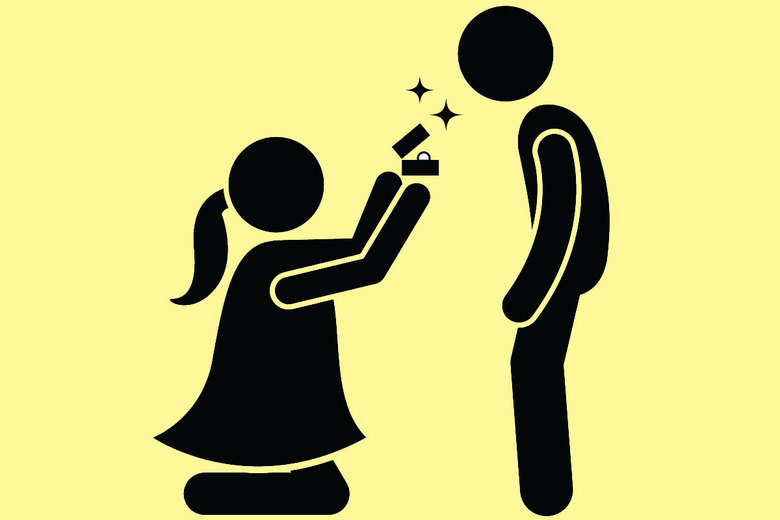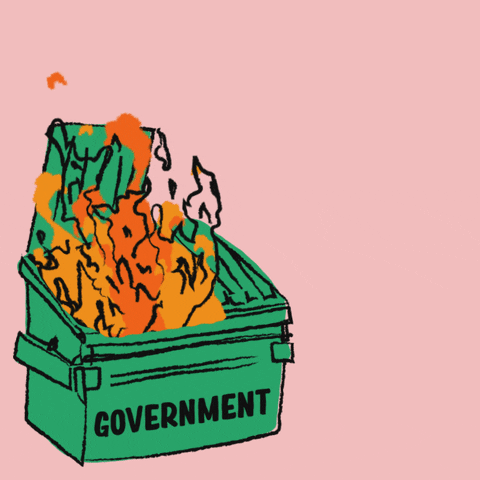Edition #42: Our Narrow, Gendered Lens
Plus, the writing machine that is Danielle Steele, write or receive a poem for democracy, and an utterly raw performance

A Note From the Editor
I’ve been thinking a lot about gender this week, reciting old tropes and challenging my own experiences and assumptions under a more fastidious gaze. During one of these reflections, I recounted a conversation I had last year with one of my most brilliant friends. We were having dinner outside in the West Village, enjoying salads and french fries and the chill in the end-of-summer air when the topic of marriage came up. I probably asked her something boring, like “do you think you’ll marry him?”, partly because I was interested but also because I feel a covert obligation to ask such things to my friends who have been with their partners for multiple years. Her answer was refreshing and level-headed: yes, probably, but only after she accomplished certain things in her career, and by no means did she want a wedding ring. It was an outdated tradition, she insisted, one that she felt no attachment to.
I was baffled, impressed, and probably a little intimidated. I’ve always classified myself as a feminist, but I had not yet considered the inherent lopsidedness of the traditional engagement ring, and the traditions associated with heterosexual engagements in general. In these instances, the man is almost always the inciter; he carefully plans for the moment, coordinating with family and friends and photographers, he purchases the perfect ring, perhaps with the help of a pushy sister or a steadfast best friend, and the woman waits. She waits and waits and waits. Maybe she quietly frets over the timing, attempting to drum up a sense of feigned nonchalance as she scrolls past yet another photo of The Perfect Engagement on Instagram. And even if her patience grows thin, she probably doesn’t consider taking matters into her own hands, because what would that even look like?
This one-sided dynamic doesn’t start and end with engagements, rather it is an inevitable endpoint to the way we are conditioned to understand our place in the framework of a gendered society. From early on, most heterosexual romantic encounters rely on male-led initiative. In high school, the boy typically asks the girl to prom, a notion that is constantly reinforced by movies and pop culture à la Never Been Kissed. The man asks the woman on the first date, and at the start of a monogamous relationship, the man is most often the one to bring up the “exclusive,” “in a relationship,” “boyfriend and girlfriend” talk. Being on the woman’s end of these weighted transactions for the past twenty-eight years, I can at least speak for myself when I say that in a lot of cases, the woman doesn’t innately want to wait, the same way I assume that the man doesn’t always want to be the sole proprietor in a relationship’s progress. A guy friend of mine once said, “in a relationship, the man is constantly pushing forward and the woman is either accepting or rejecting it.” It didn’t bother me at the time because it was, and still is, true, but I’m beginning to question why this has to be the case, and why I’ve accepted it at face value for so long.

How can we insist on equality while simultaneously buying into such antiquated notions without further prodding? How can we think once a ring is secured and home is purchased and children are born, things will magically become more equitable, despite the fact that our very foundation was built upon haphazard grounds that grant one party the power to choose when and how and where, while expecting the other party to patiently wait? I suppose I was of that frame of mind when, earlier this year, I tried to enlist a handful of my girlfriends to send their partners flowers for Valentine’s Day. Like a true type-A Virgo, I even made an instructional sign up sheet, and you may not be surprised to hear my efforts didn’t go very far. “He would kill me,” one friend, whose partner works in a male-dominated Wall Street office, texted. “Cute idea,” another commented halfheartedly. In the end, I became discouraged and distracted, and I did not send my partner flowers at his job — though in retrospect I wish I would have, as it may have been the last Valentine’s Day involving a brick-and-mortar office for some time.
We take down Confederate monuments when we realize they are no longer a reflection of the world we are currently living in. We expect the courts to make rulings and Congress to write legislation that mirrors the core values we hold as a modern society, and those landmark decisions have granted millions of Americans greater freedoms: the right for LGBTQ people to marry, the right for women to choose what to do with their bodies, the right for transgender people to be protected from discrimination in the workplace. We are, ideally, constantly moving forward as a collective, expanding our points of view and challenging the way things have always been. Maybe it’s time to apply that same level of modernized scrutiny to gender roles in romantic relationships. Perhaps we are long overdue for an update.
While many individuals have a fairytale attachment to the notion of declaring eternal love in the form of a diamond, consider the troublesome history engagement rings. Back when virginity was a prized commodity amongst prospective brides, a woman could sue a man who didn’t follow through with his engagement under “Breach of Promise” laws. The argument was that the man had made her a less appealing prospect by taking her virginity without committing to her, and now he owed her. When those laws were struck down, engagement ring purchases skyrocketed. The engagement ring was, in essence, virginity insurance — if your fiance decided to have pre-marital sex with you and didn’t follow through with his commitment, or if he married you and later changed his mind, at least you would have an expensive ring as collateral. It doesn’t sound so romantic when you put it that way.
Cheers, my dears, and I’ve got a question or two for you:
Do you think the heterosexual traditions surrounding engagement is problematic?
How do these nuanced dynamics manifest in same-sex relationships, or relationships involving one or more transgender person, or gender nonconforming person? Are these problems purely heteronormative?
I’d love to hear your thoughts and observations in the comments below.
P.s., if you’re new here, welcome! I hope you find something worth discussing in this week’s edition. I like you already.
Three Pieces of Content Worth Consuming
How the Hell Has Danielle Steele Managed to Write 179 Books? You probably know Danielle Steele from the paperback spines on your grandmother’s bookshelf, but did you know she is an otherworldly writing machine? I haven’t stopped thinking about this piece since I read it last year, as there is something inherently interesting about the various daily rituals of writers. I especially like reading about what writers eat in the morning: one piece of toast and iced decaf coffee followed by mini chocolate bars for Steele, a can of ice-cold morning Coca-Cola with a straw for Joan Didion. After reading this piece, Google Danielle Steele’s net worth, and then try to tell me you can’t make money as a writer. Looks like all of her 22 hour days have paid off!
A Pulitzer Prize Investigative Reporter on the Upcoming Election. I really tried to avoid adding political content in this section this week. I thought, “this newsletter is already pretty loaded today,” but this piece feels far too important to put off. I’ve been annoyed, then livid by the narrative “what happens if Trump doesn’t leave office?” that has been softly circulating in the press, because in my mind those stories open a door for Trump, and give him permission. After reading this piece, though, I’m beginning to realize that it probably isn’t a matter of if, but when. Though we want to assume that nothing like that could ever happen because this is America, it’s best to remove our blinders and educate ourselves about the scenarios that may unfold come November. This one is long but very much worth the time. Read it over the weekend, share it with others, discuss, and try to take five deep breaths, because we’re in for a wild ride.
How to Foster the Japanese Concept of ‘Shoshin’. This shouldn't come as such a surprise, but somehow it was for me: the more you think you know about a subject, the more close-minded you tend to be about it. The concept of shoshin is rooted in the idea of approaching life from a place of humble intellect versus fixed expertise, thus creating more opportunities to learn without wrongly assuming you know more than you do. This handy guide suggests the first step to developing shoshin is testing your knowledge on a subject you think you know a lot about by trying to explain it aloud to others — the idea being that you may not know as much as you think you know. One of my favorite quotes from the guide:
‘In the beginner’s mind there are many possibilities, but in the expert’s there are few.’
Perhaps You Should…
Write (or Recieve) a Poem, For Democracy

In an Instagram Live video posted shortly after the tragic death of Ruth Bader Ginsburgh last Friday, AOC shared a message that resonated with me in a way that similar sentiments have not. She talked about how everyone has something unique to give at this critical moment, and that it’s up to us, as individuals, to find out what it is that we have to contribute. Inspired by the idea, I decided to send an email to a handful of my friends and family members who I knew were at least mildly politically interested and currently employed, urging them to make a donation to one of the key Senate races in 2020. On a whim, I concluded with, “ if you donate to one of the campaigns above and reply to this email telling me who you donated to, I will write you a sweet little poem about yourself!” And guess what? It worked! Ten people who might not have made donations made donations, and I learned that I am a below average poet. No matter who you are or where you are, you have something special to give, even if it’s simply a personal email to those in your network who might have $5 or $10 to spare but might need a little bit of encouragement. And if you’re feeling inspired to take action, I’ve got something for you:
Want to send your own email? Here is a handy template I created for you, which includes a generic message you can easily plug in to and a more specific example of what your email could look like.
Not the organizing type? No problem! If you donate to a key Senate race and either comment on this post or email me with proof of your donation, I’ll write you your very own, sweet little mediocre poem! In the likely chance that we don’t yet know each other personally, I will simply Google you in the name of poetic research before writing.
**Bonus Content** (An Absolute Must Watch)

You know when you drive past an accident and you know you shouldn’t slow down to look at it, but you do it anyway out of some strange, uncontrollable instinct? That is exactly how I felt the first time I watched this NPR Tiny Desk audition last weekend. I’ve watched it about six more times since then, and it is raw, mesmerizing, a little bit uncomfortable, and altogether charming. Who would’ve guessed that I love lo-fi, spoken word rap? You are now all my little peach scones.
A Quote From A Book You Should Read:
“The problem with gender is that it prescribes how we should be rather than recognizing how we are. Imagine how much happier we would be, how much freer to be our true individual selves, if we didn’t have the weight of gender expectations.”
-We Should All Be Feminists by Chimamanda Ngozi Adichie
This newsletter is best served with a side of conversation, so drop your opinions, reflections, and thoughts in the comments below and let’s get to talking.
Or, share the most thought-provoking piece from today’s edition with someone you love, then call them up to discuss, debate, and percolate. As a wise woman once said, “Great minds discuss ideas.”




I had a similar conversation regarding engagement rings with our mutual brilliant friend and was honestly a bit shook by the fact that I had never examined my own feelings on the topic. There’s a lot of general creepiness in heterosexual traditions around marriage and gender roles that I think we just swallow whole most of the time in the form of neatly curated Instagram posts. Just given human nature, inherently I think power dynamics will always exist across the spectrum of heterosexual, same-sex, transgender, and gender non-binary relationships owing to factors like race, class, socio-economic standings, personality, education, etc. However, my hope for all of us is that by acknowledging that love and relationships are experienced by and between people first and foremost and are not contingent on gender that we’ll start to explode these old expectations of what is “normal,” or “appropriate,” based on something as arbitrary as gender. That being said, I still like diamonds ... but I’m working on it ;)
"How can we think once a ring is secured and home is purchased and children are born, things will magically become more equitable, despite the fact that our very foundation was built upon haphazard grounds that grant one party the power to choose when and how and where, while expecting the other party to patiently wait?"
As someone approaching my fifth wedding anniversary with the prospect of kids and first-time home-ownership on the near horizon, this sentence hit hard. It also surprised me how little I evaluated the gender norms that guided me through dating, then engagement, then marriage. I think this may be at the core of why so many hetero couples still struggle with equity, even if the male partner is ostensibly a feminist.
I also think it is interesting to consider how the gender pay gap plays a role in shaping norms around romantic relationships. Who has been/who is more able to afford elaborately planned dates, an engagement ring, a house etc.?